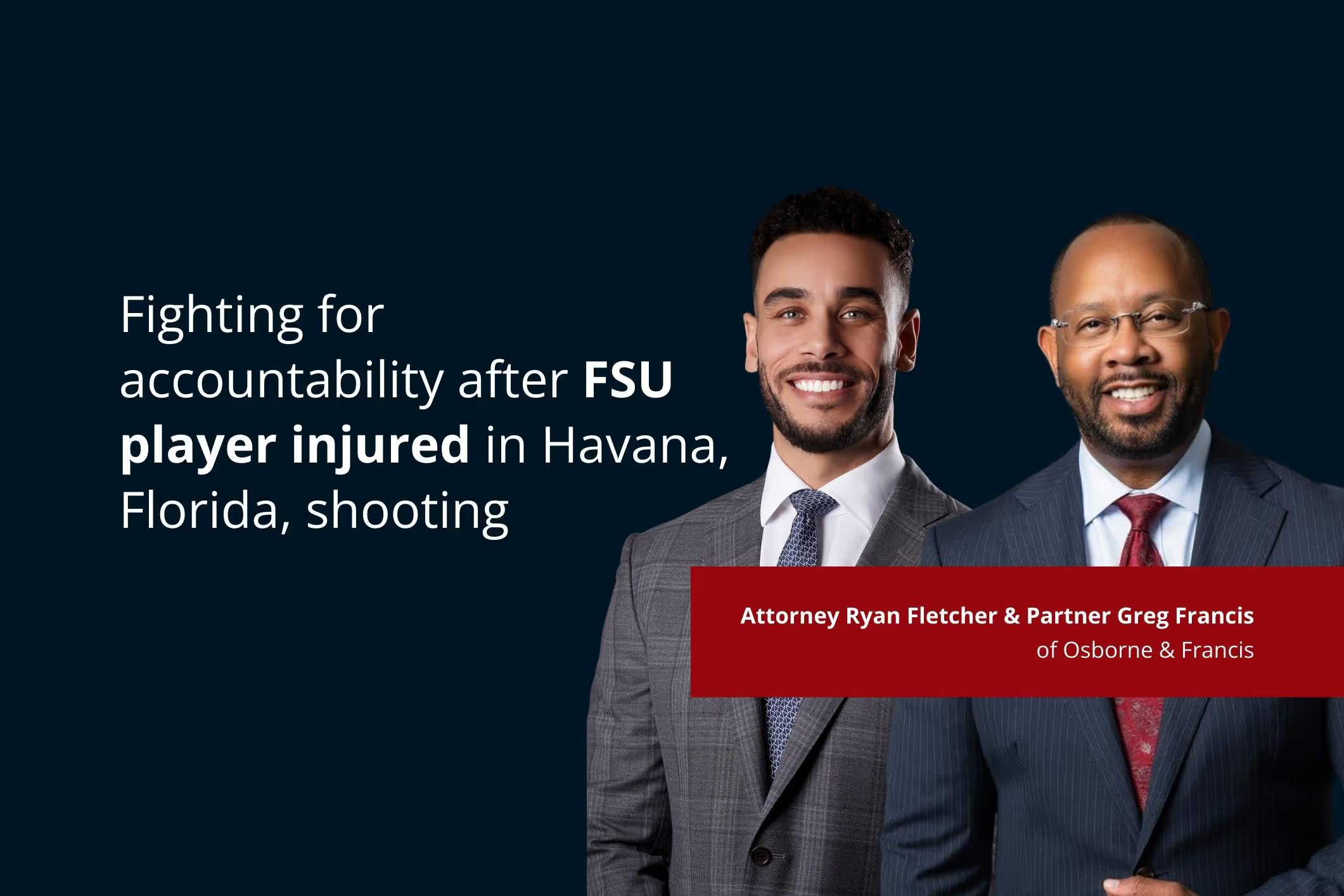Every year, Florida records approximately 400,000 car accidents, 250,000 of which result in injuries. The fact is, cars are dangerous and being involved in an accident brings a high probability of injury. The most common injuries from car accidents in Florida are described below.
If you have been in a car accident and are injured, contact the Florida car accident attorneys at Osborne & Francis today for a free case evaluation. You can call us at (561) 293-2600 or contact our Boca Raton or Orlando office online.
Bruising
Bruises are usually not serious and often heal within a week or two. However, if you get a bruise in a car accident, it may be a sign of something more serious and you should monitor it closely. Some bruises can be much worse and penetrate as deep as the bone. If a bruise develops into a hematoma or contusion, that may be a sign of a more significant injury beneath the bruise.
Pay special attention to any bruises on the head, as they may be a sign of brain injury, which can escalate quickly.
Signs that a bruise may signify a greater injury include:
- Loss of motion or weakness, particularly in the legs
- Numbness or “pins and needles” feeling
- Severe swelling or pain
- Nausea and/or vomiting
- Headaches and vision problems
- Not improving in a week or seeming to get worse
- Blood in the urine
- Fever
- Shallow vision
Broken Bones
Bone breaks and fractures are common injuries during a car accident due to the severe amount of force put on the body during a collision. Broken bones can mean anything from a fracture in the arm to a broken jaw bone or cracked ribs. There is also the possibility of broken bones leading to more serious complications like infection.
Broken bones are not always detectable at the time of the crash, so it’s important to seek medical treatment right away after a car accident so a doctor can fully examine you.
Types of bone fractures common to car accidents:
- Stress Fracture - hairline crack
- Partial Fracture - doesn’t go all the way through the bone
- Closed Fracture - bone is broken underneath unbroken skin
- Open Fracture - breaks and exits through the skin
- Displaced Fracture - bone breaks into multiple pieces and moves
- Non-Displaced Fracture - the bone breaks but stays where it was
Neck Injuries
Injuries to the neck's muscles, tendons, cartilage, and other soft tissues are extremely common during a car accident. As a speeding vehicle collides with something, it comes to a sudden stop which forces the head and body forward and causes damage to the spine.
Whiplash is a neck injury that occurs when the neck moves quickly forward and backward. Though not visible, whiplash or other trauma can take months to heal and may lead to a life of pain.
The steering wheel and airbags can also lead to neck injuries that need medical attention.
Whiplash
As we mentioned above, whiplash is a type of neck injury that occurs during a car accident. Whiplash is the most common injury in a car accident and is often caused by rear-end collisions. Whiplash can be extremely painful, but it usually heals within several weeks. Despite this, it is still painful, can cause time off work, and create serious medical bills.
Signs that you suffered whiplash during a car accident include:
- Neck pain
- Stiffness
- Pain when moving your neck
- Loss of range of motion
- Headaches
- Pain in the shoulder, upper back, and/or arm
- Tingling and/or numbness
- Fatigue
- Dizziness
Brain Injuries
Traumatic Brain Injuries (TBIs) are common injuries that result from a vehicle crash. In fact, one of the most common causes of TBIs is motor vehicle accidents. TBIs are notoriously slow to appear and diagnose, and can be extremely detrimental to a person’s life.
In fact, each year, TBIs cause around 2.8 million ER visits and hospitalizations and 50,000 deaths.
TBIs are a type of head injury that includes hits to the head, penetrating injuries, and coup injuries which are caused by the brain moving around in the skull.
The mildest type of TBI is usually categorized as a concussion while the most severe forms can cause death or lifelong problems.
A TBI can cause complete changes in a person’s life, affect their mood and relationships, and can be extremely expensive to treat.
Symptoms of a mild traumatic brain injury may include:
- Headache
- Nausea or vomiting
- Fatigue or drowsiness
- Speech problems
- Dizziness
- Sensitivity to light or sound
- Cognitive, behavioral or mental symptoms
- Feeling depressed or anxious
Symptoms of a moderate to severe traumatic brain injury may include:
- Loss of consciousness from several minutes to hours
- Persistent headache or headache that worsens
- Repeated vomiting or nausea
- Convulsions or seizures
- Inability to awaken from sleep
- Weakness or numbness in fingers and toes
- Loss of coordination
- Profound confusion
- Agitation, combativeness or other unusual behavior
- Slurred speech
- Coma
- Death
Concussions
A concussion is a sudden, violent movement of the brain that can cause chemical changes and further problems. They are potentially serious and life-threatening, and can worsen over time. In the long term, they can cause changes in movement, sensation, personality, and cognitive function, as well as depression and other mental illnesses.
If you think you experienced a concussion from a car accident, you should get immediate medical attention.
Back Injuries
After a car accident, back pain and soreness is common. Although some back injuries resolve themselves with rest, others cause ongoing discomfort or result in an inability to perform daily activity without pain.
Back pain can be a sign of a much more severe injury, so it is important that you seek medical care right away. Seeking immediate treatment will allow a doctor to assess your injuries and refer you for follow-up care before the pain and damage gets more severe.
Some people initially feel okay and don’t experience intense back pain until several days later. That’s why you should get checked out by a doctor even if you don’t think your back was injured.
If left untreated, a back injury can lead to chronic pain requiring an orthopedic treatment and surgery, and will most likely result in a mountain of medical bills, daily pain, and a decrease in quality of life.
Some common back injuries from a car accident include:
- Strain
- Sprain
- Slipped or herniated disc
- Ruptured disc
- Pinched nerve
- Broken vertebrae
Wrist and Hand Injuries
Injuries to the hands and wrists are also common in car accidents. The delicate bones in the hand and wrist work together in a complex relationship, and if you need surgery you can lose a lot of function while it heals. Injuries that involve amputation of fingers or toes sometimes happen as well, in addition to dislocation.
Leg and Foot Injuries
The legs and feet are extremely susceptible to injuries during a car accident. These bones and tissues can take the brunt of a forward crash and may get pinned below the dash. The foot, like the hand, is full of small bones and important tendons. Any damage to these areas can result in lifelong problems.
Facial Injuries
Facial injuries refer to damage or injury to anywhere on the face. This includes the delicate parts of the eyes, nose, mouth, and ears. It can also include dental injuries which are a common result of serious car accidents. Both facial and dental injuries are common in collisions because the face is exposed and may collide with the dashboard, airbag, or other objects in the vehicle.
- Soft tissue injuries: injuries to tendons, cartilage, muscles, ligaments, and other soft tissue in the face are common in car accidents
- Lacerations: cuts to the face which can require stitches and may leave permanent scars
- Bone fractures: facial bones may break and sometimes cannot heal properly, causing disfigurement
- Eye injuries: debris, lacerations, and blunt force trauma during an accident can all damage the eye and potentially cause blindness
- Burns: serious burn injuries may require skin grafting and cause scarring and discoloration.
- Facial deformities: any injuries to the face can cause permanent disfigurement, causing lost of function and emotional trauma
- Dental damage: during a collision, teeth can break, be knocked out, or otherwise damaged which will require surgery to repair
In certain car accidents, facial injuries may be so severe that they result in disfigurement that can lead to emotional and mental trauma. You don't have to suffer because of someone else's negligence. Contact our firm for a free case evaluation.
Internal Bleeding
Internal injuries, including bleeding, can occur from a blunt force that does not penetrate the skin but injures the muscles, bones, organs, and other tissues underneath.
An internal injury may not appear immediately, which is why it's important for anyone involved in a car accident to go to the emergency room even if they don't think they are injured. Shock and adrenaline can cover up and even the most severe injuries.
Any abdominal bruising should be taken seriously, as the seat belt can strike internal organs if used improperly. If you see anything resembling an abdominal hematoma, go to the hospital immediately.
Burns
A car accident can lead to severe burns if a driver or passenger comes in contact with the hot engine parts, spraying liquids, or exposed flames. This is more common than most people think. Severe burns can cause death or life-threatening injuries. They can also be responsible for serious emotional trauma and are extremely painful.
Scars and Disfigurement
Facial injuries and burns can cause disfiguring scars that change a person’s appearance, cause severe pain, and can be extremely expensive to treat. These scars can require reconstructive and plastic surgery, and may never entirely disappear. This can limit the ability of the victim to earn income, participate in daily activities, and otherwise live a normal life.
Scars can also cause other long-term problems, including depression and anxiety. This type of injury is a common precursor to a type of damage known as pain and suffering. Pain and suffering compensation is usually reserved for severe situations in which a victim experiences intense emotional distress or loss of enjoyment of life. Severe scars and disfigurement are a prime example of this.
Paralysis
Spinal cord injuries can cause paralysis, which can be categorized as partial or total. Partial results in the loss of movement in one limb or a limited area of the body part. Full paralysis usually refers to a full love of movement and control.
Motor vehicle accidents typically cause paralysis by dislocating or fracturing vertebrae and tearing or bruising the spinal cord. There is no cure for spinal cord injury, and it is likely to result in surgeries, physical rehabilitation, pain treatment, and a serious change in one’s quality of life. Paralysis is one of the most serious injuries we see after car accidents.
Loss of Limbs
The force of a car accident can remove a limb entirely or cause such damage that the limb needs to be removed. This leads to long-term and expensive rehabilitation, prostheses, and other assistive devices. It can significantly limit your daily activities and can result in extreme emotional trauma.
Emotional Pain and Trauma
Long after an accident, emotional distress and physical pain can persist, and can greatly influence your quality of life. Being involved in a severe car accident can create PTSD, anxiety, and an overall sense of fear. You may also miss out on daily activities, such as hobbies, spending time with family, sex, and other pleasures of life.
Contact an Experienced Car Accident Injury ASAP
Car accidents can result in all kinds of serious injuries leaving you with medical bills, lost wages, and pain and suffering. If you were injured during a car accident, you need the help of an experienced Florida car accident attorney to help you recover maximum compensation.
Contact Osborne & Francis today by calling (561) 293-2600 or by contacting our Boca Raton or Orlando office online. The sooner you empower us to pursue your case, the sooner we can seek the settlement you deserve.

.avif)












.avif)


.svg)




